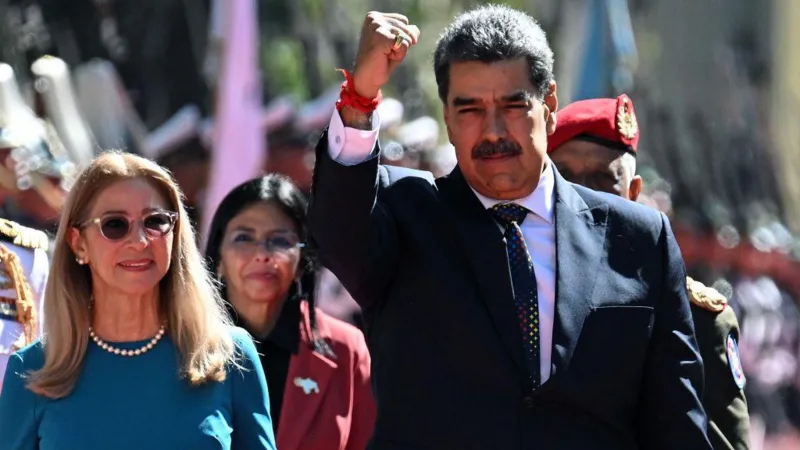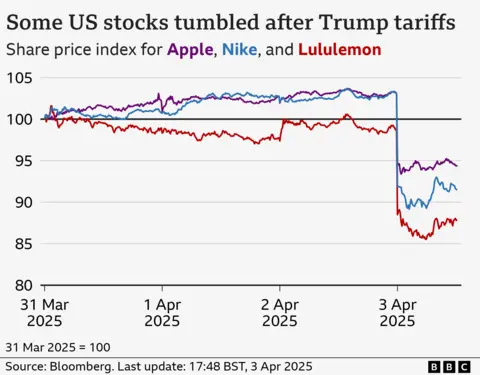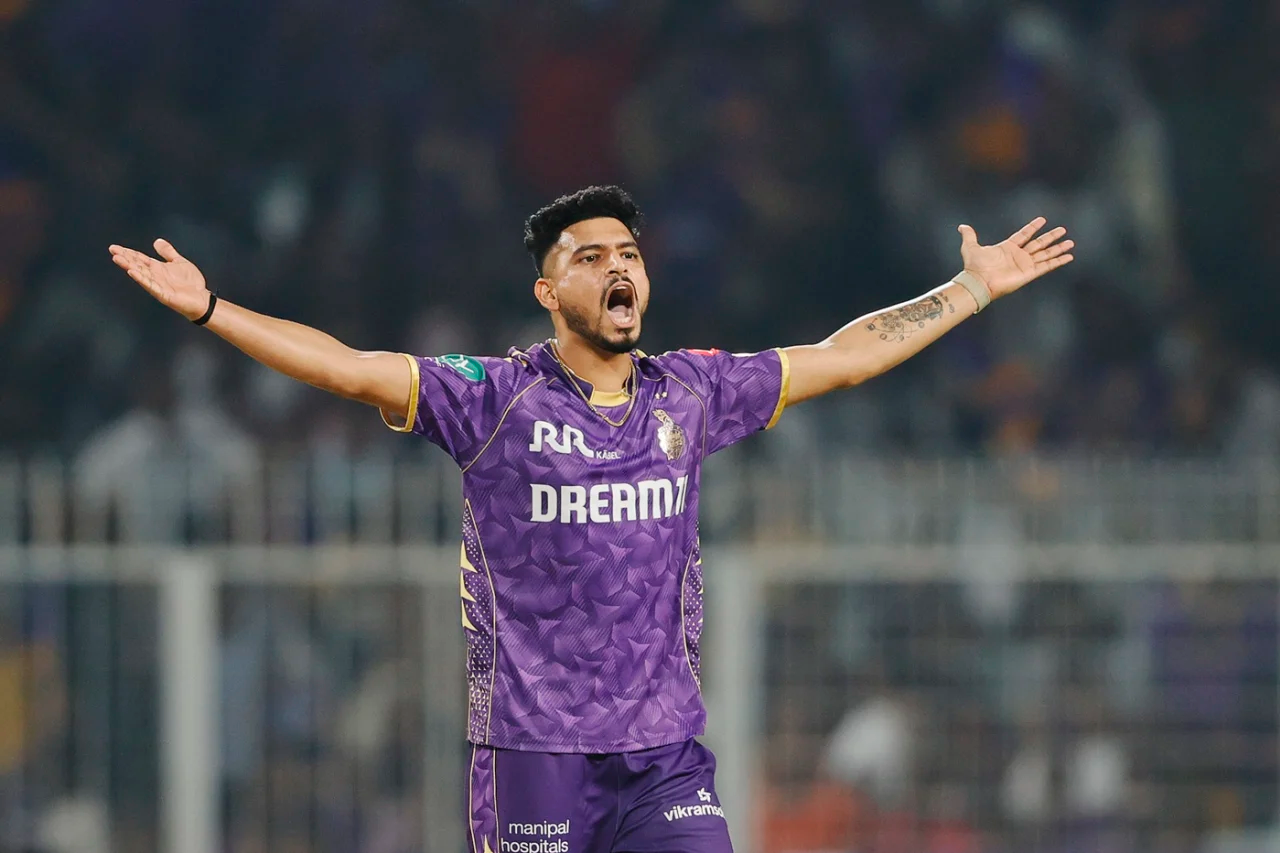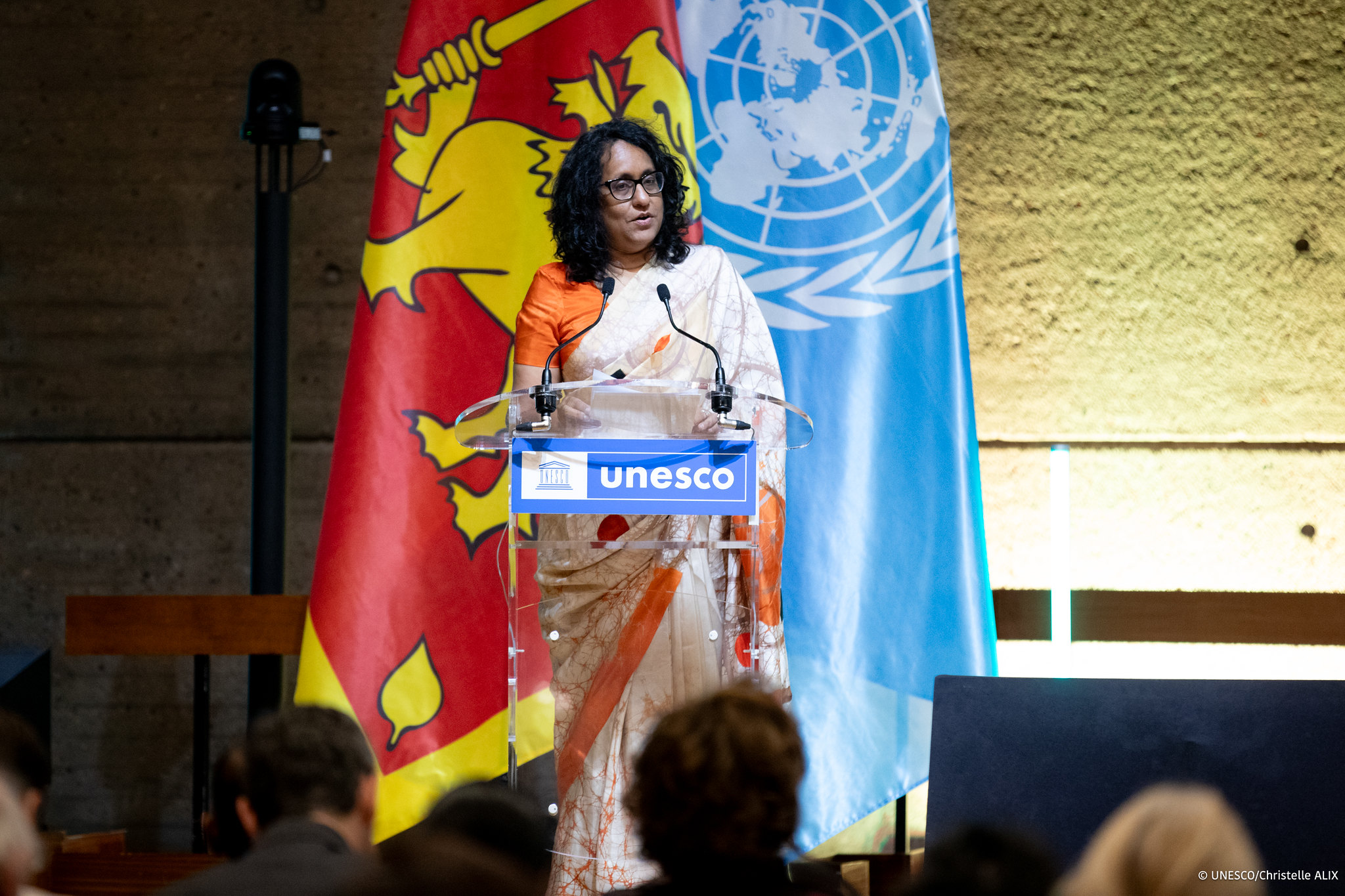Latest News
US announces $25m reward for arrest of Venezuela’s Maduro

The US has announced an increased $25m (£20.4m) reward for information leading to the arrest of Venezuelan President Nicolás Maduro on the day he was sworn in for a third six-year term in office.
The inauguration ceremony was overshadowed by recrimination from the international community and Venezuelan opposition leaders.
Rewards have also been offered for information leading to the arrest and or conviction of Interior Minister Diosdado Cabello. A new reward of up to $15m for Defence Minister Vladimir Padrino has also been offered.
The UK also issued sanctions on 15 top Venezuelan officials, including judges, members of the security forces and military officials.
The Foreign, Commonwealth and Development Office said those sanctioned were responsible for “undermining democracy, the rule of law, and human rights violations”.
Foreign Secretary David Lammy went on to describe Maduro’s regime as “fraudulent”.
Also on Friday, the EU said it was extending “restrictive measures” against Venezuela because of “the lack of progress… leading to the restoration of democracy and the rule of law”. The bloc also sanctioned a further 15 Venezuelan officials.
Canada also imposed fresh sanctions in what Foreign Minister Mélanie Joly called Maduro’s “shameless actions”.
Joly said Canada “will not tolerate the erosion of the democratic process or the repression of citizens seeking to express their rights”.
Maduro and his government have repeatedly denounced many of the allegations made by Western countries and opposition leaders.
The reward from the US cites narcotics and corruption charges dating back to 2020.
In 2020, the US changed Maduro and other senior officials in the country with “narco-terrorism”.
It accused them of flooding the US with cocaine and using drugs as a weapon to undermine the health of Americans.
Maduro has rejected the accusations. The US also re-imposed oil sanctions last year, after temporarily easing them in the hope Maduro could be incentivised to hold free and fair elections.
The Venezuelan president has blamed an economic collapse in his country on US-led sanctions he calls illegitimate and imperial. His critics blame corruption and economic mismanagement.
On Friday, President Maduro took the oath of office, vowing his third six-year term in office would be a “period of peace”.
“This new presidential term will be the period of peace, prosperity, equality, and the new democracy,” he said.
“I swear by history, I swear by my life, and I will fulfil it,” he added.
The 28 July election results were widely rejected by the international community, including by Brazil and Colombia, some of Venezuela’s left-wing neighbours.
(BBC)
Business
Trump tariffs trigger steepest US stocks drop since 2020 as China, EU vow to hit back

Global stocks have sunk, a day after President Donald Trump announced sweeping new tariffs that are forecast to raise prices and weigh on growth in the US and abroad.
Stock markets in the Asia-Pacific region fell for a second day, hot on the heels of the US S&P 500, which had its worst day since Covid crashed the economy in 2020.
Nike, Apple and Target were among big consumer names worst hit, all of them sinking by more than 9%.
At the White House, Trump told reporters the US economy would “boom” thanks to the minimum 10% tariff he plans to slap on imports in the hope of boosting federal revenues and bringing American manufacturing home.
The Republican president plans to hit products from dozens of other countries with far higher levies, including trade partners such as China and the European Union. China, which is facing an aggregate 54% tariff, and the EU, which faces duties of 20%, both vowed retaliation on Thursday.
Tariffs are taxes on goods imported from other countries, and Trump’s plan that he announced on Wednesday would hike such duties to some of the highest levels in more than 100 years.
The World Trade Organization said it was “deeply concerned”, estimating trade volumes could shrink as a result by 1% this year.
Traders expressed concern that the tariffs could stoke inflation and stall growth.
In early trading on Friday, Japan’s benchmark Nikkei 225 index fell by 1.8%, the Kospi in South Korea was around 1% lower and Australia’s ASX 200 dipped by 1.4%.
On Thursday, the S&P 500 – which tracks 500 of the biggest American firms – plunged 4.8%, shedding roughly $2tn in value.
The Dow Jones closed about 4% lower, while the Nasdaq tumbled roughly 6%. The US shares sell-off has been going on since mid-February amid trade war fears.
Earlier, the UK’s FTSE 100 share index dropped 1.5% and other European markets also fell, echoing declines from Japan to Hong Kong.
On Thursday at the White House, Trump doubled down on a high-stakes gambit aimed at reversing decades of US-led liberalisation that shaped the global trade order.
“I think it’s going very well,” he said. “It was an operation like when a patient gets operated on, and it’s a big thing. I said this would exactly be the way it is.”
He added: “The markets are going to boom. The stock is going to boom. The country is going to boom.”
Trump also said he was open to negotiating with trade partners on the tariffs “if somebody said we’re going to give you something that’s so phenomenal”.
On Thursday, Canada’s Prime Minister Mark Carney said that country would retaliate with a 25% levy on vehicles imported from the US.
Trump last month imposed tariffs of 25% on Canada and Mexico, though he did not announce any new duties on Wednesday against the North American trade partners.

Firms now face a choice of swallowing the tariff cost, working with partners to share that burden, or passing it on to consumers – and risking a drop in sales.
That could have a major impact as US consumer spending amounts to about 10% – 15% of the world economy, according to some estimates.
While stocks fell on Thursday, the price of gold, which is seen as a safer asset in times of turbulence, touched a record high of $3,167.57 an ounce at one point on Thursday, before falling back.
The dollar also weakened against many other currencies.
In Europe, the tariffs could drag down growth by nearly a percentage point, with a further hit if the bloc retaliates, according to analysts at Principal Asset Management.
In the US, a recession is likely to materialise without other changes, such as big tax cuts, which Trump has also promised, warned Seema Shah, chief global strategist at the firm.
She said Trump’s goals of boosting manufacturing would be a years-long process “if it happens at all”.
“In the meantime, the steep tariffs on imports are likely to be an immediate drag on the economy, with limited short-term benefit,” she said.
On Thursday, Stellantis, which makes Jeep, Fiat and other brands, said it was temporarily halting production at a factory in Toluca, Mexico and Windsor, Canada.
It said the move, a response to Trump’s 25% tax on car imports, would also lead to temporary layoffs of 900 people at five plants in the US that supply those factories.
On the stock market, Nike, which makes much of its sportswear in Asia, was among the hardest hit on the S&P, with shares down 14%.
Shares in Apple, which relies heavily on China and Taiwan, tumbled 9%.
Other retailers also fell, with Target down roughly 10%.
Motorbike maker Harley-Davidson – which was subject of retaliatory tariffs by the EU during Trump’s first term as president – fell 10%.
In Europe, shares in sportswear firm Adidas fell more than 10%, while stocks in rival Puma tumbled more than 9%.
Among luxury goods firms, jewellery maker Pandora fell more than 10%, and LVMH (Louis Vuitton Moet Hennessy) dropped more than 3% after tariffs were imposed on the European Union and Switzerland.
“You’re seeing retailers get destroyed right now because tariffs extended to countries we did not expect,” said Jay Woods, chief global strategy at Freedom Capital Markets, adding that he expected more turbulence ahead.
[BBC]
Latest News
IPL 2025: Venkatesh and Arora consign Sunrisers Hyderabad to their biggest-ever defeat

While Kolkata Knight Riders (KKR) regained the dazzling batting form they had lost somewhere on their trip to Mumbai, the Sunrisers Hyderabad (SRH) batting continued to be lackluster as they slumped to their third loss in a row after starting IPL 2025 with a mammoth 286. Four days after being skittled for 116 by Mumbai Indians, KKR posted a stiff 200 for 6, led by a 29-ball 60 from vice-captain Venkatesh Iyer and an unbeaten 17-ball 32 from Rinku Singh. Venkatesh and Rinku enabled KKR to finish with a bang – they scored 78 runs in their last five overs – after Ajinkya Rahane and Angkrish Raghuvanshi set things up with a third-wicket stand of 81.
SRH were punished for being sloppy in the field more than a few times, and managed just 120 in reply after the KKR quicks took their mighty top three down in just 13 balls. Last year’s runners-up slumped to the bottom of the table while the defending champions jumped five places from last to fifth.
Travis Head fell cheaply for the second time in a row against Vaibhay Arora as in the IPL final last year, while Abhishek Sharma and Ishan Kishan managed just 2 each. The eight runs scored by SRH’s top three was their second worst start in the IPL. In last year’s final, their top three – though Kishan wasn’t part of it – had managed just 11.
SRH barely recovered from 9 for 3 and slipped to 66 for 5 and eventually suffered their biggest defeat by a runs margin in the IPL.
There was no venom in the pitch, no unplayable bounce or movement either, but the SRH top order had no answers for the KKR pace attack, even though Mitchell Starc is no longer part of it. Head skied the second ball to mid-off, Abhishek edged a slower one from Harshit Rana in the second over to slip, and Kishan smashed one to cover where Rahane pouched a sharp catch on the tumble to delight the home fans. Nine for 3 could have become 9 for 4 had Andre Russell held on to an on-drive from Kamindu Mendis at mid-on and made it a double-wicket maiden for Arora. Russell, however, redeemed himself when he got the next wicket as soon as the powerplay ended, having Nitish Reddy caught at long-on. Arora picked up his third eventually, getting the big scalp of Henrich Klaasen for 33 when he returned for his second spell.
In between, Reddy showed glimpses of his ball-striking talent, Mendis heaved a couple of sixes on the leg side off Russell, and Klaasen tried to take the game deep even as the asking rate climbed past 15 an over. Rahane stifled SRH with five overs in a row from Sunil Narine and Varun Chakarvarthy, from the eighth to the 12th, which went for just 33 and brought two more wickets, before Arora removed Klaasen and Varun nearly scalped a hat-trick in the 16th over. SRH were eventually bowled out for 120, again raising question marks over their batting approach.
Even though the Eden pitch didn’t have the spice that was offered by the Wankhede’s in KKR’s last game, they lost their openers cheaply again. Narine fell to another yorker, edging one behind this time, for 7, and Quinton de Kock pulled a short ball to deep square leg for 1 off 6 as KKR crawled their way to 17 for 2 after three overs. They got a lift thanks to the Mumbai duo of Rahane and Raghuvanshi, who between them struck four sixes in 14 balls to help KKR end the powerplay on 53 for 2. Rahane smashed three of them, even before hitting his first four, peppering the leg-side boundary with two pulls and a majestic flick behind square.
Cummins brought on spin as soon as the field spread out and rookie legspinner Zeeshan Ansari rewarded his captain by stifling the set batters with turn, flight and different lengths to concede just 25 runs in three overs on the trot while the quicks continued to leak boundaries from the other end. Ansari conceded just one boundary off his first 14 deliveries, that too off a misfield from Reddy, before Raghuvanshi carted him for a six and four when he erred too full. Ansari, however, fought back with Rahane’s wicket for 38.
SRH could have had two in two had Reddy not put down Raghuvanshi at the rope on 43. Raghuvanshi made them pay with a cover drive for four later in the over and brought up his second IPL fifty in the next. His luck finally ran out against the ambidextrous Sri Lanka spinner Kamindu Mendis, and when Harshal Patel held onto an excellent catch that he dived for after running in from deep point.
KKR were going at just over eight an over after 13 overs, with two new batters in the middle. Harshal and Simranjeet Singh slowed them down further by taking the pace off the ball, but the trick didn’t work for too long. Rinku and Venkatesh took off once they got their eyes in and powered KKR to their first 200 total of this campaign. Rinku started the carnage with three consecutive fours off Harshal in the 17th while Venkatesh reeled off two in the next over, which Rinku finished with a towering six over long-on. Venkatesh then turned his purr into a roar in the penultimate over. Even though Cummins tried his cutter, a slower bouncer and a yorker among other things, Venkatesh went 4, 6, 4, 4 and brought up a 25-ball fifty before blasting Harshal for a six and a four at the start of the final over. He holed out next ball, and Harshal conceded just three off the last three, but the damage had already been done.
Brief scores:
Kolkata Knight Riders 200 for 6 in 20 overs (Venkatesh Iyer 60, Angkrish Raghuvanshi 50, Ajinkya Rahane 38, Rinku Singh 32*; Mohammed Shami 1-29, Pat Cummins 1-44, Zeeshan Ansari 1-25, Harshal Ptel 1-43, Kamindu Mendis 1-04) beat Sunrisers Hyderabad 120 in 16.4 overs (Nitish Kumar Reddy 19, Kamindu Mendis 27, Heinrich Klaasen 33,Pat Cummins 14; Vaibhav Arora 3-29, Varun Chakravarthy 3-22, Harshit Rana 1-15,Andre Russel 2-21, Sunil Narine 1-30 ) by 80 runs
[Cricinfo]
Latest News
PM underscores the outstanding universal value of Anuradhapura’s Living Heritage at International Expert Conference in Paris

Prime Minister Dr. Harini Amarasuriya who is on an official visit to France from 31 March to 2 April 2025, participated in the high-level segment of the International Expert Conference on “An Integrated and Sustainable Approach to Safeguarding the World Heritage Property of the Sacred City of Anuradhapura in Sri Lanka and Associated Living Heritage”, held at UNESCO Headquarters in Paris on Tuesday 1 April 2025.
The International Conference was organized by UNESCO in partnership with the Government of Sri Lanka to showcase the universal significance of the Sacred City of Anuradhapura and its associated living heritage, and to garner international cooperation for its conservation and sustainable development.
Inaugurating the Conference, Director-General of UNESCO Audrey Azoulay warmly welcomed Prime Minister Amarasuriya to UNESCO, while recalling her own memorable visit to Sri Lanka in July 2024 where she had the valued opportunity to witness firsthand the “exceptional heritage” of the Sacred City of Anuradhapura, which she described as “a spiritual hub, a royal capital of over a 1,000 years, and the birthplace of Theravada Buddhism.” Referring to the inscription of Anuradhapura in the world heritage list in 1982, she underscored the importance of global solidarity and international cooperation in safeguarding this extraordinary world heritage for posterity, and the intent of the Conference to explore further means of its conservation and sustainable development through international cooperation. In concluding her address, the Director-General recalled the words of renowned Sri Lankan archaeologist and former President of ICOMOS International Dr. Roland Silva, that Anuradhapura continues to be “a modern wonder of the world.’
Addressing the high-level segment, Dr. Harini Amarasuriya outlined Sri Lanka’s national vision to preserve the global heritage of the Sacred City of Anuradhapura for education, pilgrimage and heritage tourism, while ensuring the maintenance of a careful balance between conservation, sustainable development, and the needs of local communities. The Prime Minster also extended her deep appreciation to Director-General Azoulay for her vision and leadership which was instrumental in convening this International Conference dedicated to Anuradhapura.
Striking a personal note, the Prime Minister reminisced about her childhood and youthful memories of this heritage city, where she felt “the magic of Anuradhapura, the sense of awe at the creativity and skills of our ancestors.” She described Anuradhapura as “a unique mix of the ’sacred’ (activities belonging to the spiritual realm) and the ’profane’ (relating to the everyday and the material realm),” while also highlighting the advanced architectural and hydraulic expertise of this ancient civilization, whose origins can be traced back to 900 BCE.
Referring to UNESCO’s institutional mandate, the Prime Minister commended the organization—led by the Director-General, the secretariat, and its member states—for its invaluable contributions to advancing global discussions on education reform, mainstreaming cultural recognition, and harnessing knowledge and innovation for global peace and sustainable development amid complex geopolitical challenges.
Delivering the keynote address, the Minister of Buddhasasana, Religious and Cultural Affairs Dr. Hiniduma Sunil Senevi presented the integrated management plan of the Government of Sri Lanka towards the sustainable and integrated management of the Sacred City of Anuradhapura. He reiterated the Sri Lanka Government’s commitment to preserving the Outstanding Universal Value of the heritage site through inclusive, sustainable development. He further urged the international community to join hands with Sri Lanka in safeguarding this shared heritage for future generations, and to ensuring that its benefits reach local communities.
The Conference brought together internationally recognized experts, senior officials of government, development partners, heritage professionals and the diplomatic corps in exploring innovative and sustainable approaches to integrated site management. The key themes discussed comprised the integration of tangible and intangible heritage, capacity building, strengthened community participation, the application of digital tools in conservation, sustainable tourism aligned with World Heritage guidelines, and the critical importance of international partnerships and resource mobilization for long-term preservation of this heritage site.
The Prime Minister had a meeting with Director-General Azoulay on the sidelines of the Expert Conference where thematic areas of cooperation were discussed. The Prime Minister highlighted Sri Lanka’s interest in enhancing UNESCO’s presence in the country through suitable programmes, and apprised the Director-General on progress in Sri Lanka’s Category II South Asia Centre for Teacher Development (SACTD), Sri Lanka’s engagement in the programme of work of UNESCO, Sri Lanka’s educational reforms and areas of synergy with UNESCO, as well as the country’s commitment to the annual celebration of Vesak in UNESCO, among other matters. The Director-General reiterated UNESCO’s continued commitment to supporting Sri Lanka’s multifaceted collaboration with the international body.
At a reception hosted by the Ambassador and Permanent Delegation of Sri Lanka to UNESCO, the Prime Minister underscored the importance of Sri Lanka’s 75-year partnership with UNESCO, and reaffirmed the country’s commitment to further strengthening this collaboration in key areas of cooperation. She did so in her capacity as the Minister of Education, Chairperson of the Sri Lanka National Commission for UNESCO, and Chairperson of the Central Cultural Fund.
The Prime Minister also formally handed over to the Director-General, Sri Lanka’s Instrument of Accession to the 2005 UNESCO Convention on the Protection and Promotion of the Diversity of Cultural Expressions, demonstrating the country’s commitment to promoting cultural diversity, artistic freedom, and international collaboration. Ambassadors and Permanent Delegates accredited to UNESCO, senior representation of the UNESCO Secretariat including Director and team of the World Heritage Centre, the President of the France – Sri Lanka Friendship Group in the French National Assembly, expert participants of the Conference, academics, scholars and senior officials of the French Ministry for Europe and Foreign Affairs attended the reception and conveyed their warm greetings and felicitations to the Prime Minister.
The delegation of the Prime Minister comprised the Minister of Buddhasasana Religious and Cultural Affairs Dr. Hiniduma Sunil Senevi; the Director General, Central Cultural Fund Dr. Nilan Cooray and the Director General, Department of Archaeology Prof. Thusitha Mendis. The Prime Minster was assisted by the Ambassador and Permanent Delegate of Sri Lanka to UNESCO Manisha Gunasekera and senior staff of the Embassy and the Permanent Delegation of Sri Lanka to UNESCO.
[Prime Minister’s Media Division]
-

 Sports5 days ago
Sports5 days agoSri Lanka’s eternal search for the elusive all-rounder
-

 News4 days ago
News4 days agoBid to include genocide allegation against Sri Lanka in Canada’s school curriculum thwarted
-

 News6 days ago
News6 days agoGnanasara Thera urged to reveal masterminds behind Easter Sunday terror attacks
-

 Sports1 day ago
Sports1 day agoTo play or not to play is Richmond’s decision
-

 News5 days ago
News5 days agoComBank crowned Global Finance Best SME Bank in Sri Lanka for 3rd successive year
-

 Features5 days ago
Features5 days agoSanctions by The Unpunished
-

 Features5 days ago
Features5 days agoMore parliamentary giants I was privileged to know
-

 Latest News3 days ago
Latest News3 days agoIPL 2025: Rookies Ashwani and Rickelton lead Mumbai Indians to first win











